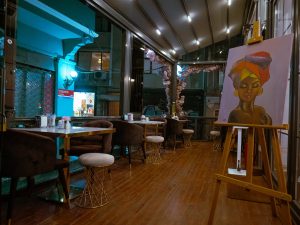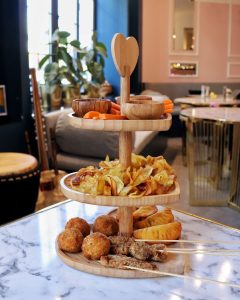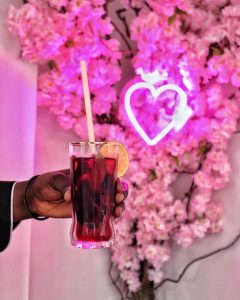Siyah: Kara Lounge – An Oasis of Senegambia and the African Diaspora in Istanbul

Kara Lounge is a lively space where the Senegambian and broader African Diaspora’s vibrant flavours, sounds and art unite, offering a sanctuary for those seeking a sense of home and community. This is the nineteenth instalment in Siyah; a series exploring African Diaspora and Turkish social and cultural narratives, with journalist Adama Juldeh Munu.
This piece was originally published for The New Arab in October 2024, for the UK’s Black History Month and contains slight alterations to the original text.
Benachin, fried tilapia fish, bissap, ginger beer, djembe drums, straw woven bowls, displays of beaded bracelets, necklaces, and portraits of Black femininity are signposts one may not typically associate with Istanbul’s historic neighbourhoods. Less so for the city’s Beyoğlu district, which is renowned for its late 19th and early 20th century Western-influenced and Art Nouveau architecture, charming antique stores and outdoor cafés. But Kara Lounge restaurant is a place that stands out.
I first learned about Kara Lounge in 2021, a year after it opened, when I was invited there for a meeting of a Black women’s collective, composed of African-American, West African and African-Caribbean women. This was three years after I moved to Istanbul. I was excited to know that the culinary tastes of my native Sierra Leone and wider West African heritage were nearby, like peanut butter stew, which Sierra Leoneans call granat stew, or maafé as it is called in Senegal.
Kara Lounge was founded by 40-year-old Khodia Mbaye, who moved to Istanbul eleven years ago from France and is of Senegalese heritage. She recognised a unique opportunity to showcase African culture to Africans living in Turkey and a broader international audience.

‘The name Kara was intentionally chosen. In Turkish, kara means black, connecting both the restaurant’s identity to the neighbourhood. It is located in Karaköy, which means black village or black district in Turkish. In this context, the word ‘black’ is not used negatively but rather as a proud identifier’, Khodia tells me. She says that although opening a restaurant wasn’t her initial vision, she had always wanted to create a space that would bring people together.
It’s impossible to miss Kara Lounge when you arrive at Cezayir Street. Its sign is a striking, pink logo that lights up in the evening. Next to it is the icon of a Black woman in a stunning African headwrap.
There are beautiful arrangements of pink flowers cascading over the windows and exterior of the restaurant, leading onto a porch where people can eat and drink outside. Opposite the restaurant is an array of printed images of well-known Black leaders and thinkers like Burkina Faso’s former leader, Thomas Sankara, and former Black Panther party member and intellectual, Angela Davis.
This wall reflects the purpose of Kara Lounge- that is, a space that shows the diversity and beauty of Black cultures.
Ahead to the right, is a long-winding stairway that is reminiscent of so many like it in the city- a portal to another world. On either side of this street are boutique cafés and restaurants that are brightly colourful and fluorescent. It evokes a sense that one is in either the Fener or Balat neighbourhoods, which were once the main hubs for thriving Jewish and Greek Orthodox communities.
Kara Lounge’s interior has a soft, pastel-like touch, with light pink walls, mostly navy-blue cushioned seating, and different pieces of African art. For me, it feels like home; a space where Blackness is celebrated and loved. The restaurant serves delicious Senegalese delicacies and meals from other West African countries like Ghana, the Ivory Coast, Nigeria, and Sierra Leone.
The last time I had eaten here was during Ramadan in April 2024. My go-to was ateke and plantain, a dish from the Ivory Coast, that consists of rice cassava, fried fish and plantain with salad. One of the other popular dishes is the (in)famous Jollof rice which is made from long-grain rice, tomatoes, chillies, onions and spices. Claimed by several West African cultures, it is nevertheless believed to have originated in the Senegal region. Then there’s tiep which is comprised of dried fish, rice cassava and an assortment of garden vegetables and maafé.
Khodia, like many other continental Africans you would meet here, is proud of her ethnic roots, which are Casamance Creole and Wolof. However, she is also passionate about Africa as a whole. ‘Africa is stereotyped as a place of poverty and despair. However, those familiar with the continent understand that this is far from the truth. Africa is rich in culture, history, and diversity, with much more wealth than hardship in many areas. Kara Lounge aims to challenge these misconceptions and emphasise the beauty and vibrancy of African cultures through food and community’ Khodia explains.
She is also what I would call a ‘true sister’ of the African Diaspora; a term that describes the collective of African-descended and/or Black communities in the Americas, Europe and beyond. One such gesture that encapsulates this is the availability of a red drink called bissap, which is made from hibiscus flowers, ginger, cloves, and citrus. While known as sobolo in Ghana, zobo in Nigeria, it is called sorrel in the Caribbean and Rosa de Jamaica in parts of Latin America. Bissap is also part of a beverage tradition of red drinks that plays a significant role in celebrating liberation in the United States, especially during Juneteenth commemorations.
As author of Soul Food (2014) Adrian Miller suggests, hibiscus tea and kola nut tea were the underpinnings for what is known as Red Drink, as records show some form of it was drunk on plantations during and after chattel slavery in the US. Judith Carney, a professor of geography at the University of California at Los Angeles found that ‘Enslaved people taken from West Africa carried hibiscus seeds to the Caribbean, the first port of call on the slave route, where the plant thrived. As the displaced Africans adapted to the unfamiliar settings, they altered their red drink recipes, drawing on the flora and traditions of the different Caribbean islands, adding spices like nutmeg, cinnamon, bay leaves, sugar and occasionally spirits like rum.’
Kara Lounge is more than just a restaurant; it serves as a vibrant hub for cultural exchange, community engagement, and empowerment for the Black diaspora in Istanbul. It also gives Black women opportunities and training. 21-year-old Armida Bakyana is an international relations student in Istanbul, but whose family comes from Burkina Faso and currently lives in France. She was an events coordination trainee at the restaurant and organised a quiz night in October to commemorate Black History Month (not officially celebrated in Turkey), among other activities. ‘Because I study politics and history, I want to organise and promote and inform people about Black histories and at the same time educate people here, who do not know as much about our struggles and liberation [movements]. People know about Malcolm X and Nelson Mandela, but a lot of people do not know about what and who inspired them,’ Armida explains.

Likewise, for other Black women, Kara Lounge has been a space for them to connect to their roots; to find a sense of belonging in a city far away from home, while forging new connections and a shared cultural identity.
Personally, here, I have been able to connect with three of my subcultures. Firstly, I purchased my first pair of Bhoylé earrings—gold-plated pieces that symbolise my Fulani background. Secondly, I have been able to enjoy performances by djembe drummers and a female djeli (griot) from the Guinean Mandinka people, who share my heritage as descendants of the Mali Empire. And then there’s an active Black diaspora culture embodied in moments with some of the Black women I’ve found communion with in my time here. Whether that’s when we’ve made jewellery together or been engaged in a dance session.
Raycene Nevils Karakeci is a writer, editor, translator and university lecturer from Detroit, Michigan who lives in Istanbul. She tells me that ‘I always thought of my Blackness as a uniquely American experience. I never really saw myself as part of the diaspora until I met the community here. As a community organiser that serves expat women, I like to use my free time to bring people together. I’m most passionate about bringing Black women together, because for a long time that was a missing part of my Istanbul experience, which was shaped by how people perceived me as a Black woman. Outside of Ethiopian food, I never had any other African food as an African-American.
And yet the food profile tastes familiar to me. I kept coming back because these were foods that reminded me of home. I needed to see a community that moves like me, speaks like me, looks like me and tastes like me. I love that we have this (space) at the centre of our community now.’
Kara Lounge is one of many African food establishments that have been on the increase in Istanbul in recent years, due to the growing number of Black communities that have made their home here. A report from the state’s Anadolu Agency suggests that as of 2017, there are up to around 1.5 million Africans living in Turkey, with at least a quarter of them residing in Istanbul. Meanwhile, other studies provide more conservative figures.
View this post on Instagram
African communities have become more prominent in areas like Şişli, Başakşehir and Aksaray in the Fatih district, also known as ‘Little Africa.’ This is where Zulu Restaurant and Café, which opened several years ago, serves delicacies from West and Southern Africa. Nearby, one can find numerous Somali internet cafés and restaurants, such as Fahiye Somali Cafe & Restaurant and Waaberi Restaurant. Again, in the Beyoğlu district, near the famous Taksim area, the Habesha Restaurant offers delicious Ethiopian cuisine, with popular dishes like injera—a sour, fermented pancake-like flatbread served with various sauces and stews. Outside of central Istanbul, in Esenyurt, the Nigerian community there has introduced restaurants like Suya Bistro. Suya is a Nigerian street food that consists of smoky, spiced beef skewers served with onions, tomatoes, and lime juice.
Locals and visitors can immerse themselves in the African heritage present in the city, which serves as a reminder that even in a place as old as Istanbul, new and vibrant food stories are being written every day.


 (@habesharestaurant)
(@habesharestaurant)
